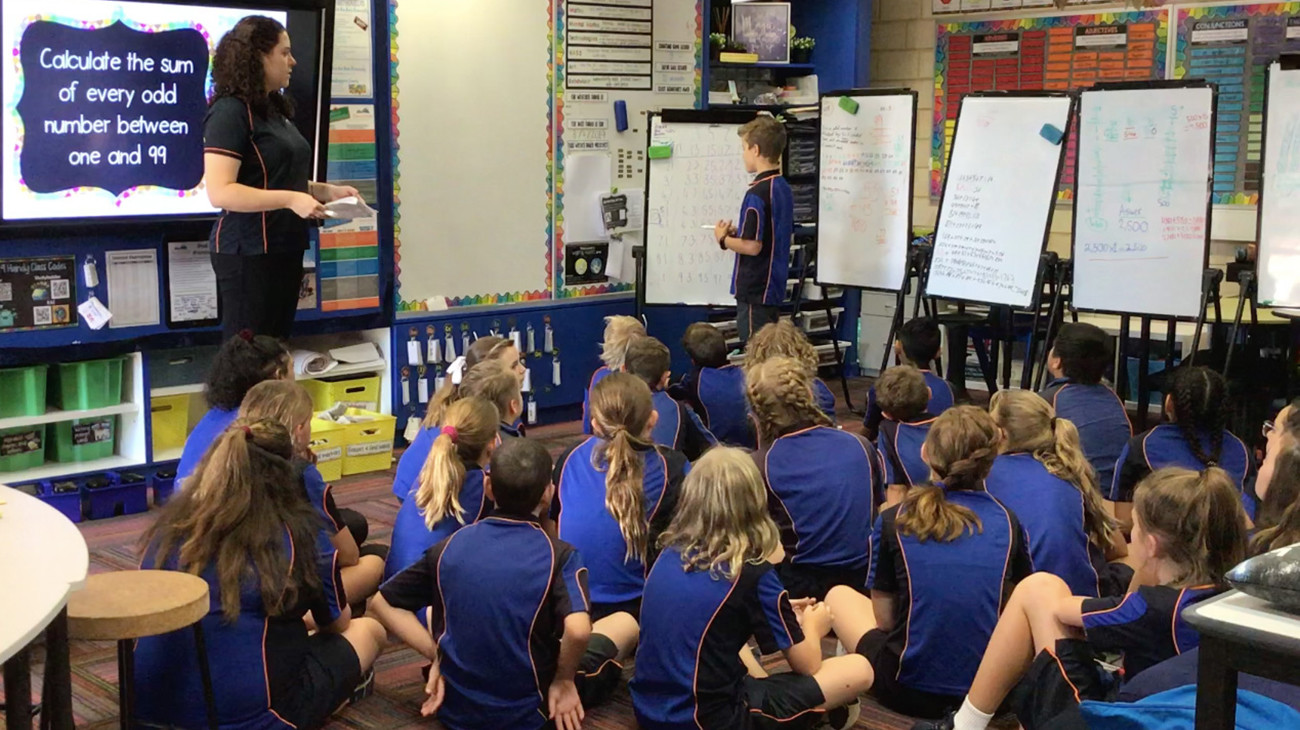Posted Tuesday, 20 May 2025
Scitech to spark science curiosity across the Kimberley
Scitech is embarking on an epic tour across the Kimberley, visiting 26 remote community schools.
Students and teachers in WA’s Southwest will be further strengthening their Math skills over the next 3 years, thanks to a continuing partnership between Alcoa and Scitech.

Students and teachers in Western Australia’s South West, Peel and Perth metropolitan primary schools have been strengthening their Math skills thanks to a new component in the Alcoa Maths Enrichment Program (AMEP).
Since 2012, Scitech and Alcoa of Australia have delivered the Alcoa Maths Enrichment Program to ensure that teachers have the capacity and confidence to facilitate deep learning of mathematical concepts. This in turn improves children’s maths skills, ensuring they are equipped to meet the demands of the STEM-enabled future workforce.
The new ‘Alcoa Champions of Maths’ (ACoM) component was introduced at the beginning of 2019.
ACoM is expected to indirectly benefit more than 8,000 students per year through the upskilling of maths teachers and the ‘multiplier’ effect this creates.
The teachers recruited into the program are also trained to deliver this professional development to their colleagues, with the aim of creating a ‘ripple effect’ within the school community to ensure the impact is deeper and ongoing.
ACoM focuses on developing more efficient and effective methods and practices in the classroom through intensive one-on-one mentoring and coaching over the course of a year. The program has had an immediate positive impact on teachers and students. From inception, teachers have reported more confidence in their teaching capabilities and by August, a participant survey showed a 50% increase in teaching confidence for problem solving and a 58% increase in certainty for assessing mathematical reasoning.
Scitech’s Shyam Drury who leads the Alcoa Maths Enrichment Program, says “Students can get deeply engaged in pure mathematical ideas – with no real-world context – when they are presented in the right way.”
“During our Champions of Maths lessons, I have seen Year 6 students working at university level thinking, demonstrating how engaged they are with the problems we are presenting. The students have learnt to hold respectful debates and share and test each other’s ideas with brilliant results. Through this, they are transforming not only how they view maths, but also how they view themselves. It’s so exciting to see what students are capable of as a direct result of this program.”
Kate Archibald, Year 6 Classroom Teacher at Treendale Primary School, said “In our Mid-Program Questionnaire, I was delighted to see a massive shift in student responses since the start of the year. Overall, my class have moved towards enjoying math lessons almost all the time, enjoying challenges and feeling more confident in their own abilities.”
“To me, these survey results were the evidence I needed to prove the observations I had made about increased student engagement and attitudes, and, a fantastic way to convince others to begin this journey themselves.”
“Working with my colleague Lisa Tatham, who is also taking part in the Program, I have continued to develop all that we have learnt in our classrooms and have started to spread this across the school.”
Teachers have also noted a difference in how they can cater to the needs of different levels of learning in their classroom. Treendale Primary School’s Year 5 teacher Lisa Tatham says, “My involvement with Champions of Maths has shown me how one great question can bring a powerful equality to my classroom, where every student could engage and learn at their own level.”
“The beauty of my classroom now, is that no one thinks that any one person is smarter than anyone else. There are no ‘bottom’ groups or ‘top’ groups, no ‘easy’ maths or ‘hard’ maths. A variety of ideas are considered and respected.”
“In one lesson, I asked students to show using their hands who had a better understanding of the connection between multiplication and division. They enthusiastically agreed that they all did.”
“As the recess bell went, one student lingered behind and with a big grin, she said to me ‘I think I got better at division today’.”
Even in younger age groups, such as Hilary Campbell’s Year-2’s at Eaton Primary School, the ACoM program is showing a real impact with the students.
“All my students are demonstrating greater confidence in their own abilities, maturity when facing challenges, interacting with each other and are more curious about mathematics,” Hilary Campbell says.
“The children very quickly embraced the idea of justifying their answers and in fact they enjoy explaining their ideas.”
The teachers involved in the program also contribute to the AMEP Blog created by Shyam Drury, sharing their progress, insights and ‘a-ha!’ moments in regular instalments.
The Blog is proving to be an exceptional teaching resource for teachers across the country and even abroad, with feedback showing teachers and instructional coaches from all over Australia, UK, US and Singapore taking inspiration and learning from the lessons shared.
It’s even promoting change in the way mathematical education groups around the world approach teaching mathematics, such as London’s Maths Explorers program who tweeted: “Unashamed to say this is exactly what we are also trying to do in our maths circle & enrichment clubs, but clearly so much more to learn and do better.” – @MathsExplorers (Twitter).
In the long term, it is expected that students impacted by those teachers who are engaged in the ACoM program will be more likely to study STEM subjects, demonstrate improved performance in the STEM subjects they pursue, and be better equipped to take part in a STEM-enabled future.
Upon clicking the "Book Now" or "Buy Gift Card" buttons a new window will open prompting contact information and payment details.